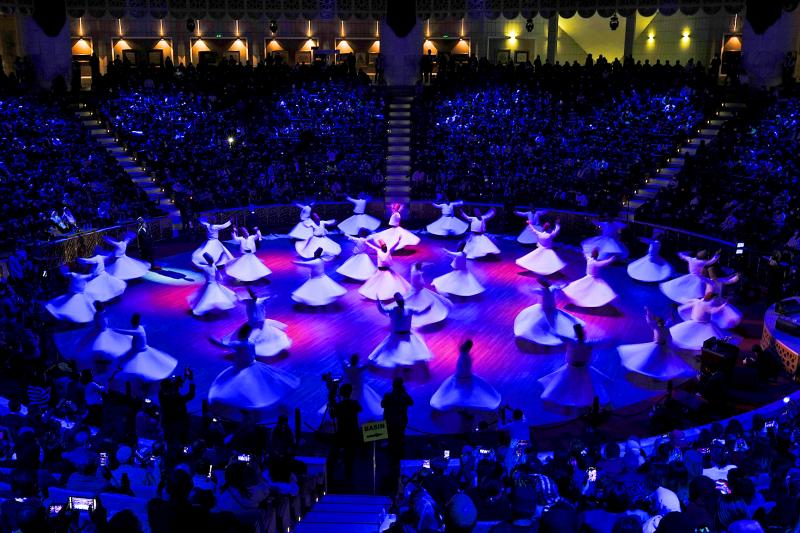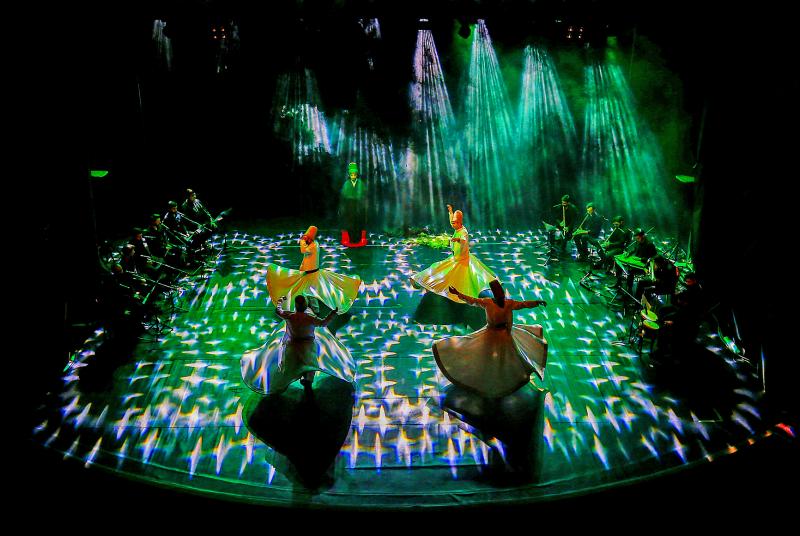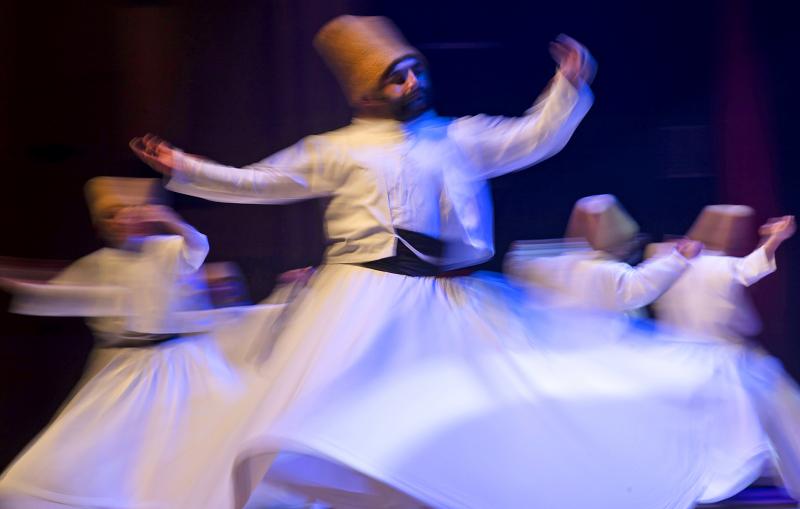Each year, thousands of people travel to the Turkish city of Konya to attend a weeklong series of events and ceremonies that mark the death of the 13th-century Islamic poet, scholar and Sufi mystic Jalal al-Din Rumi. Instead of mourning his death, however, the ceremonies celebrate what his followers believe is his union with God.
The main feature of the Sheb-i Arus or “night of the union,” is an enchanting ritual performed by the dervishes of the Mevlevi order — more commonly known as the whirling dervishes.
The rite begins with a recital of prayers and verses from the Koran. The dervishes, dressed in long white robes symbolizing shrouds, black cloaks symbolizing tombs and long headgear symbolizing tombstones, then rise from the ground to salute each other.

Photo: AP
Leaving their cloaks on the ground, they take their places around the circular floor and begin to spin to reach a trance-like state that they believe unites them with God. The ritual is performed to the sound of chanting and music from a reed flute and other instruments.
As they whirl, the dervishes’ right hands are symbolically turned upward toward God, while their left hands are turned downward to Earth.
The ceremony ends as it started, with the recital of prayers.

Photo: Reuters
Rumi, who is known as Mevlana in Turkey, was born in Balkh — which is now in Afghanistan — in 1207, but settled in Konya, where he died on Dec. 17, 1273. His son, Sultan Veled, established the Mevlevi order of the mystical form of Islam, Sufism, after his death.
Although religious orders were banned in Turkey in the early 1920s with the establishment of the secular republic, the dervishes’ rituals were regarded as a cultural heritage and the order was largely tolerated.
There are now many Sufi dervish orders around the world, including in the United States. Women have been allowed to join some lodges, although an overwhelming number of dervishes are men.

Photo: Reuters
In 2005, the UN’s cultural body, UNESCO, proclaimed the dervishes’ ritual a masterpiece of “the oral and intangible heritage of humanity.” The structure holding Rumi’s tomb in Konya is now a museum as well as a pilgrimage site.
This year, visitors were able to return to the ceremonies honoring Rumi, after the COVID-19 pandemic forced last year’s commemorations to be held without spectators.
One visitor from the US, Rupert Flowers, told the state-run Anadolu Agency that he traveled to Konya, inspired by Rumi’s best-known and welcoming quatrain: “Come! Come again! Whoever, whatever you may be, come!
“Heathen, idolatrous or fire worshipper, come!
“Even if you deny your oaths a hundred times, come!
“Our door is the door of hope, come! Come as you are!”

Cheng Ching-hsiang (鄭青祥) turned a small triangle of concrete jammed between two old shops into a cool little bar called 9dimension. In front of the shop, a steampunk-like structure was welded by himself to serve as a booth where he prepares cocktails. “Yancheng used to be just old people,” he says, “but now young people are coming and creating the New Yancheng.” Around the corner, Yu Hsiu-jao (饒毓琇), opened Tiny Cafe. True to its name, it is the size of a cupboard and serves cold-brewed coffee. “Small shops are so special and have personality,” she says, “people come to Yancheng to find such treasures.” She

Late last month Philippines Foreign Affairs Secretary Theresa Lazaro told the Philippine Senate that the nation has sufficient funds to evacuate the nearly 170,000 Filipino residents in Taiwan, 84 percent of whom are migrant workers, in the event of war. Agencies have been exploring evacuation scenarios since early this year, she said. She also observed that since the Philippines has only limited ships, the government is consulting security agencies for alternatives. Filipinos are a distant third in overall migrant worker population. Indonesia has over 248,000 workers, followed by roughly 240,000 Vietnamese. It should be noted that there are another 170,000

In July of 1995, a group of local DJs began posting an event flyer around Taipei. It was cheaply photocopied and nearly all in English, with a hand-drawn map on the back and, on the front, a big red hand print alongside one prominent line of text, “Finally… THE PARTY.” The map led to a remote floodplain in Taipei County (now New Taipei City) just across the Tamsui River from Taipei. The organizers got permission from no one. They just drove up in a blue Taiwanese pickup truck, set up a generator, two speakers, two turntables and a mixer. They

Hannah Liao (廖宸萱) recalls the harassment she experienced on dating apps, an experience that left her frightened and disgusted. “I’ve tried some voice-based dating apps,” the 30-year-old says. “Right away, some guys would say things like, ‘Wanna talk dirty?’ or ‘Wanna suck my d**k?’” she says. Liao’s story is not unique. Ministry of Health and Welfare statistics show a more than 50 percent rise in sexual assault cases related to online encounters over the past five years. In 2023 alone, women comprised 7,698 of the 9,413 reported victims. Faced with a dating landscape that can feel more predatory than promising, many in